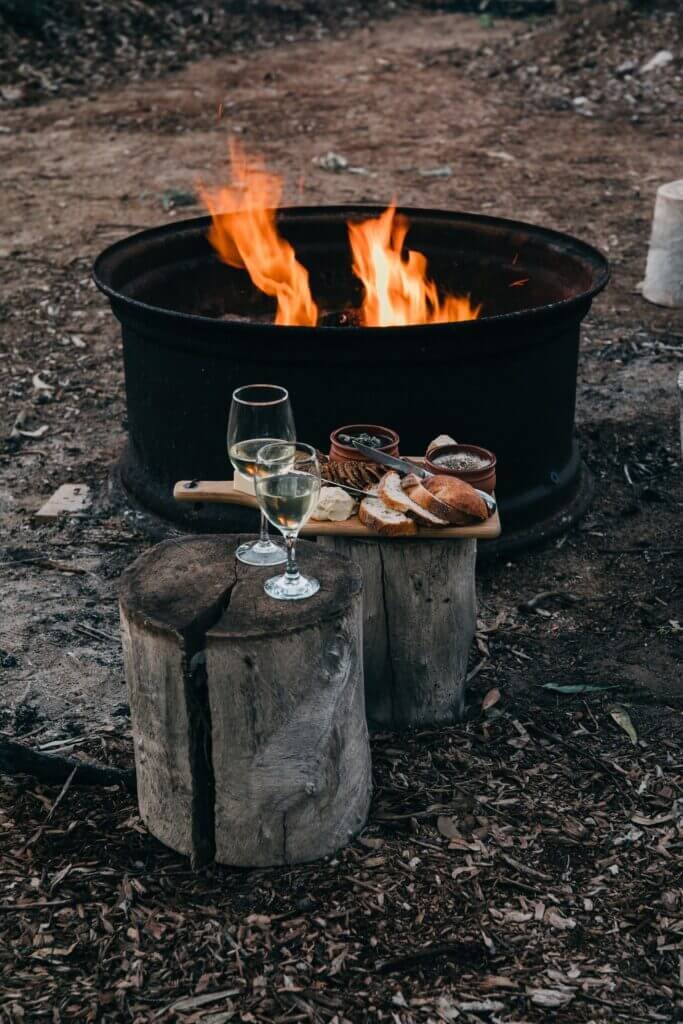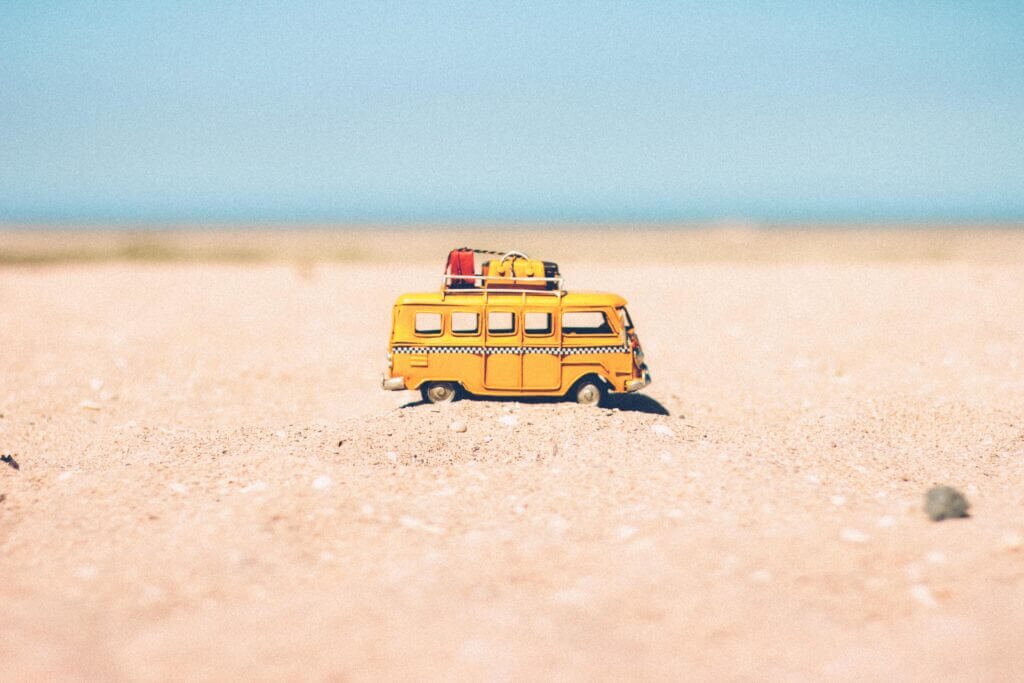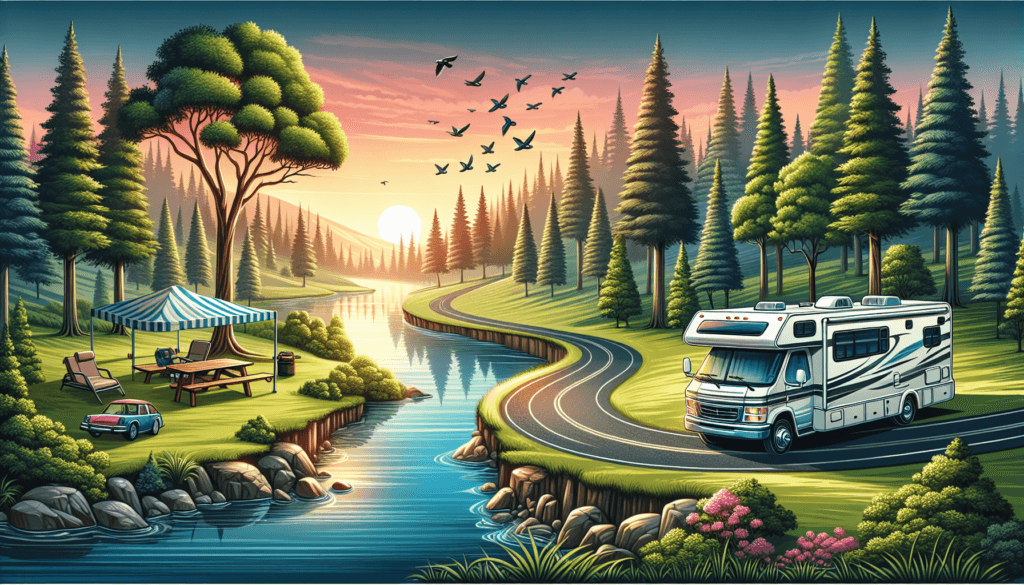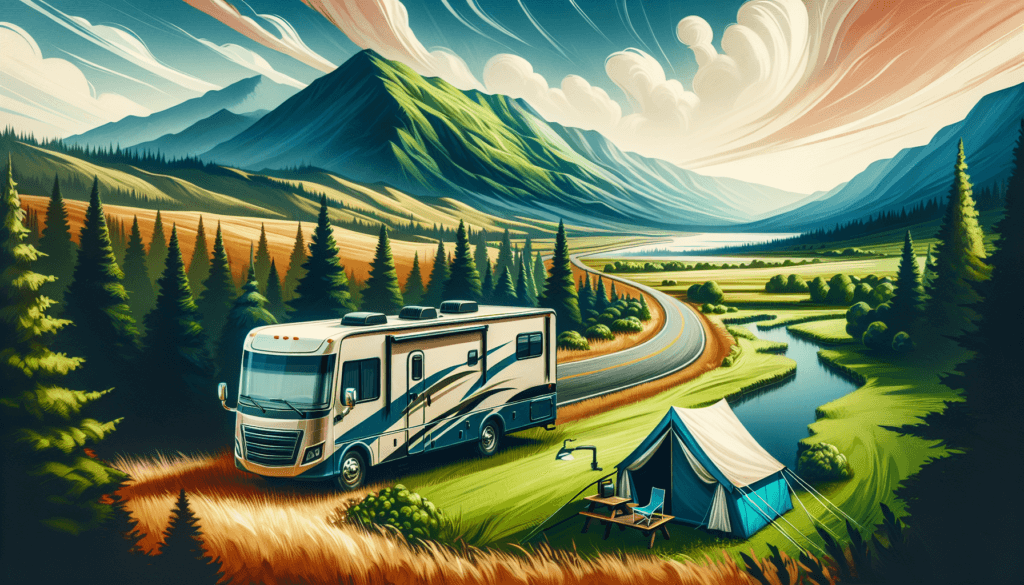Are you ready to embark on an exciting adventure in the great outdoors? Look no further than RV camping! Whether you’re a first-time camper or someone looking to try a new form of travel, “RV Camping 101: A Beginner’s Guide” has got you covered. From choosing the right RV to finding the perfect campsite, this comprehensive guide will provide you with all the essential tips and tricks to make your RV camping experience incredible. So pack your bags, fuel up your wanderlust, and get ready to hit the road with confidence!

Choosing the Right RV
Choosing the right RV is an important decision to make before embarking on your RV camping adventure. To make the best choice, you should consider your needs and budget. Take some time to think about how many people will be traveling with you and how much space you’ll need. Will you be traveling for short weekend getaways or longer trips? These factors will help you determine the size and type of RV that is best suited for you.
When it comes to the types of RVs available, there are several options to choose from. Class A motorhomes are the largest and most luxurious, offering all the comforts of home on wheels. Class B motorhomes, also known as camper vans, are smaller and more maneuverable, while still providing the necessities for comfortable living. Class C motorhomes offer a combination of the two, with space and amenities that fall between Class A and Class B. Travel trailers, fifth wheels, and pop-up campers are towable RVs that offer flexibility in terms of vehicle options and mobility.
Each type of RV comes with its own set of pros and cons. Class A motorhomes offer spacious interiors and ample storage but can be more challenging to drive and maneuver. Class B motorhomes are easier to drive and park, making them a great choice for beginners, but they may have limited space and amenities. Class C motorhomes offer a good balance between size and maneuverability, but they may come with a higher price tag. Travel trailers are affordable and can be towed with a variety of vehicles, but they require a separate tow vehicle. Fifth wheels provide more living space and stability but require a truck with a fifth wheel hitch. Pop-up campers are compact and easy to tow, making them a good option for those on a budget, but they may have limited amenities.
Planning Your Trip
Once you have chosen the right RV, it’s time to plan your trip. Researching campgrounds and RV parks is an important step in ensuring a smooth and enjoyable journey. Look for campgrounds that offer the amenities you desire, such as electric and water hookups, Wi-Fi, and laundry facilities. Consider the location and proximity to attractions or outdoor activities that you’re interested in. Reading reviews from other campers can give you valuable insights into the quality and cleanliness of the campground.
After you have chosen a campground, make reservations in advance. Many popular campgrounds fill up quickly, especially during peak season, so it’s essential to secure your spot ahead of time. Some campgrounds may require a deposit or have a minimum stay requirement, so be sure to check their policies before making a reservation.
Determine your route and duration for the trip. Map out the places you want to visit and calculate the driving distance and time between destinations. Consider the weather and any seasonal closures that may affect your plans. It’s also a good idea to check for any travel restrictions or permits that may be required along your route, such as road closures or park permits.

Essential RV Gear
To ensure a comfortable and hassle-free camping experience, it’s essential to have the right gear for your RV. Here are some must-have items to consider:
Basic Tools and Equipment
Having a basic toolkit with essential tools like screwdrivers, wrenches, and pliers is essential for any RV owner. You never know when you might need to make a quick repair or fix something on the road. It’s also a good idea to carry a spare tire and jack in case of a flat tire.
Leveling Blocks and Stabilizers
Leveling blocks are essential for stabilizing your RV on uneven ground. They help ensure that your RV is level, which is important for the operation of appliances and for your overall comfort.
Sewer and Water Connections
Investing in high-quality sewer and water connections is essential for a hygienic and convenient camping experience. Look for durable hoses with proper attachments that can quickly and securely connect your RV to the campground’s sewer and water systems.
Electrical Adapters and Extension Cords
Different campgrounds may have different electrical setups, so it’s a good idea to have a variety of electrical adapters and extension cords on hand. This will ensure that you can connect your RV to the campground’s electrical hookup without any issues.
RV Friendly Toilet Paper and Chemicals
Using RV friendly toilet paper and chemicals is crucial to maintaining your RV’s plumbing system. Regular toilet paper can clog the pipes, so make sure to use specially designed RV toilet paper. Additionally, using RV-friendly chemicals will help break down waste and control odors in your holding tanks.
Safety Equipment and First Aid Kit
Safety should always be a top priority when camping. Make sure to have a fully stocked first aid kit on hand to treat any minor injuries. It’s also a good idea to have carbon monoxide and smoke detectors installed in your RV, as well as a fire extinguisher.
Setting Up at the Campsite
Setting up at the campsite is an exciting part of the RV camping experience. Follow these steps to ensure a smooth and comfortable setup:
Choosing an RV Site
When choosing an RV site, consider factors such as the levelness of the ground, accessibility to utilities, and proximity to amenities. Look for a site that is large enough to accommodate your RV and any additional vehicles or equipment you may have.
Leveling Your RV
Using your leveling blocks, make sure your RV is level. This will not only provide a more comfortable experience inside but also ensure the proper operation of appliances and prevent any issues with your plumbing system.
Connecting Utilities
Connect your RV to the campground’s utilities, such as water, sewer, and electricity. Follow the manufacturer’s instructions for proper hookup procedures. Double-check all connections to ensure a secure and leak-free setup.
Storing and Securing Your Belongings
Utilize the storage compartments in your RV to store your belongings securely. Make sure to secure any loose items both inside and outside the RV to prevent them from shifting or flying away during transit.
Using RV Awning and Outdoor Furniture
If your RV comes with an awning, set it up to provide shade and protection from the elements. Use outdoor furniture to create a comfortable outdoor living space where you can relax and enjoy the campground surroundings.
Setting Up BBQ and Campfire
Many campgrounds allow BBQ grills and campfires. Follow the campground’s rules and regulations for setting up and using these facilities. Always practice fire safety and ensure that the fire is completely extinguished before leaving the area or going to bed.

RV Maintenance and Safety
Proper RV maintenance and safety practices are crucial for a safe and trouble-free camping experience. Here are some important maintenance tasks and safety considerations:
Regular Cleaning and Inspections
Regularly clean both the interior and exterior of your RV to keep it in good condition. Check for any signs of damage or wear and tear. Inspect the roof for leaks or damage, check the seals on windows and doors, and ensure that all appliances and systems are in proper working order.
Checking Tires and Brakes
Before every trip, check the tire pressure and tread depth of your RV’s tires. Ensure that the lug nuts are tightened properly. Additionally, inspect the braking system to ensure it is in optimal condition.
Proper Waste Management
Proper waste management is essential for the environment and the longevity of your RV’s plumbing system. Always use designated dump stations for emptying your holding tanks and follow campground guidelines for waste disposal.
Fire Safety and Emergency Exits
Install smoke detectors and carbon monoxide detectors in your RV, and regularly test them to ensure they are working correctly. Plan and practice an emergency exit strategy with all members of your travel party in case of an evacuation.
Propane Safety and Usage
If your RV uses propane, handle it with caution and follow all safety guidelines. Regularly inspect propane lines and connections for leaks. When using propane appliances, make sure to properly vent the area and never leave them unattended.
RV Driving Tips
Driving an RV requires some adjustment compared to driving a regular vehicle. Take your time, be patient, and stay focused on the road. Practice maneuvering and backing up in an open area before hitting the road. Pay attention to height restrictions, especially when entering tunnels, bridges, or gas stations. Allow for extra stopping distance, as RVs have a longer braking distance.
Packing and Organizing
Proper packing and organization are essential for maximizing space and convenience in your RV. Here are some tips to help you pack efficiently:
Create a Checklist
Make a checklist of all the items you’ll need to take with you on your trip. Categorize the list by essential items, such as clothing and toiletries, and optional items, such as outdoor recreational equipment. This will help ensure you don’t forget anything important.
Pack Essential Clothing and Personal Items
Pack enough clothing for the duration of your trip, taking into consideration the weather conditions at your destination. Don’t forget essentials like toiletries, medication, and personal documents.
Kitchen Essentials
Stock your RV kitchen with basic cooking and dining utensils, pots and pans, and food storage containers. Don’t forget essentials like plates, bowls, cups, and cutlery.
Bed and Bath Essentials
Pack bedding, pillows, and towels for each member of your travel party. Consider space-saving options like vacuum-sealed bags for bedding to maximize storage space.
Outdoor Activity Equipment
If you plan on participating in outdoor activities such as hiking, biking, or fishing, pack the necessary equipment. This might include hiking boots, fishing gear, bicycles, and camping gear.
Organization and Storage Tips
Maximize storage space in your RV by using collapsible storage containers, hanging organizers, and storage bins. Utilize all available space, including under-bed storage, overhead cabinets, and closet organizers.

Campground Etiquette
Respecting campground etiquette is not only polite but also ensures a pleasant experience for everyone. Here are some guidelines to follow:
Respecting Quiet Hours
Observe and respect the campground’s designated quiet hours. Keep noise to a minimum during these times to allow other campers to enjoy their stay.
Proper Waste Disposal
Dispose of waste in designated areas and follow campground guidelines for recycling and trash disposal. Always clean up after yourself and leave the campsite clean and tidy.
Keeping Pets Under Control
If you are traveling with pets, make sure to keep them under control at all times. Respect leash laws and clean up after your pets. Be mindful of other campers and their potential allergies or fears of animals.
Being Considerate to Neighbors
Be considerate of your neighbors and their space. Avoid walking through occupied campsites, keep voices down, and be mindful of others’ privacy and personal space.
Observing Campground Rules
Familiarize yourself with the campground’s specific rules and regulations and adhere to them. These rules are in place to ensure everyone’s safety and enjoyment.
Managing Your Resources
Properly managing your resources while RV camping is not only eco-friendly but also helps extend your self-sufficiency. Consider the following tips:
Conserving Water and Electricity
Conserve water by taking shorter showers, turning off faucets when not in use, and fixing any leaks. Use energy-efficient appliances and turn off lights and other electrical devices when not in use. Consider solar panels or a generator to supplement your electricity needs.
Utilizing Holding Tanks
Monitor your holding tanks and practice proper waste management to avoid overflow or clogs. Empty your tanks at designated dump stations and only use RV-friendly products to avoid damage.
Monitoring Propane Usage
Keep an eye on your propane levels and usage. Use propane sparingly and efficiently. Opt for electric appliances when possible to conserve propane.
Managing Food and Supplies
Plan your meals and grocery shopping to minimize food waste. Store perishable items properly and rotate stock to ensure nothing goes to waste. Check expiration dates regularly and dispose of spoiled items.
Finding Dump Stations
Research and map out nearby dump stations along your route. Knowing where to find dump stations will make it easier to dispose of your waste and maintain a clean and sanitary RV.

Cooking and Meal Preparation
Cooking and meal preparation can be a fun and delicious part of the RV camping experience. Here are some tips to make it easier:
RV Kitchen Appliances and Utensils
Familiarize yourself with the appliances and utensils in your RV kitchen. Make sure you have the necessary pots, pans, and cooking utensils. Learn how to properly operate the stove, microwave, and any other appliances.
Meal Planning and Grocery Shopping
Plan your meals ahead of time to minimize the time and effort required for cooking. Make a grocery list and shop accordingly, taking into consideration storage limitations and perishable items.
Easy and Delicious RV Recipes
There are countless easy and delicious recipes that can be prepared in an RV kitchen. Look for RV-specific cookbooks or search online for ideas. One-pot meals, foil packet dinners, and grilling recipes are all great options for RV cooking.
Outdoor Cooking Options
Take advantage of the outdoor cooking options available at your campground. Many campsites provide picnic tables and grills for campers to use. Grilling outdoors allows you to enjoy the fresh air and adds a unique flavor to your meals.
Exploring the Outdoors
One of the biggest perks of RV camping is the opportunity to explore the great outdoors. Here are some outdoor activities to consider:
Hiking and Nature Trails
Research nearby hiking trails and nature preserves. Lace up your hiking boots and hit the trails to explore the beauty of the natural surroundings. Remember to stay on designated paths and pack essential hiking gear like water, snacks, and insect repellent.
Water Activities and Swimming
If your campground is near a lake, river, or beach, take advantage of water activities like swimming, boating, or fishing. Check local regulations and safety guidelines before engaging in any water activities.
Fishing and Boating
Pack your fishing gear and enjoy a day of fishing on a nearby lake or river. Check local fishing regulations and obtain any necessary licenses before casting your line. If you have a boat, bring it along and explore the waters.
Wildlife Observation
RV camping provides a unique opportunity to observe wildlife in their natural habitats. Take the time to learn about the local wildlife and their habits. Be respectful and observe from a safe distance, never approaching or feeding wild animals.
Outdoor Safety Tips
When engaging in outdoor activities, it’s essential to prioritize safety. Wear appropriate clothing and footwear, stay hydrated, and protect yourself from the sun and insects. Follow all safety guidelines and be prepared for any unforeseen circumstances with a first aid kit and emergency supplies.
RV camping can be a rewarding and memorable experience for individuals and families alike. By following this comprehensive guide, you’ll be well-prepared to make the most out of your RV adventures. From choosing the right RV to planning your trip, setting up at the campsite, and enjoying outdoor activities, each step is crucial for a successful and enjoyable experience. So get out there, embrace the open road, and create lifelong memories with your home on wheels. Happy RV camping!


